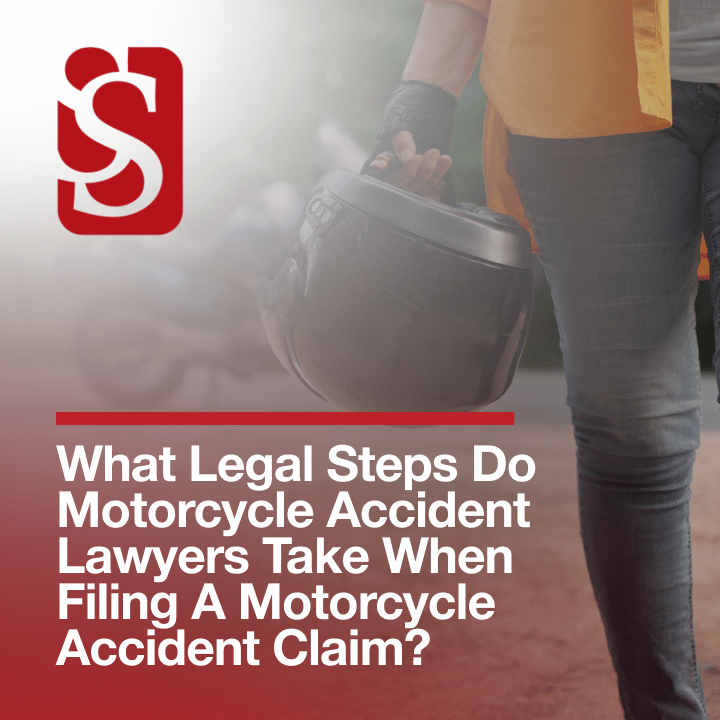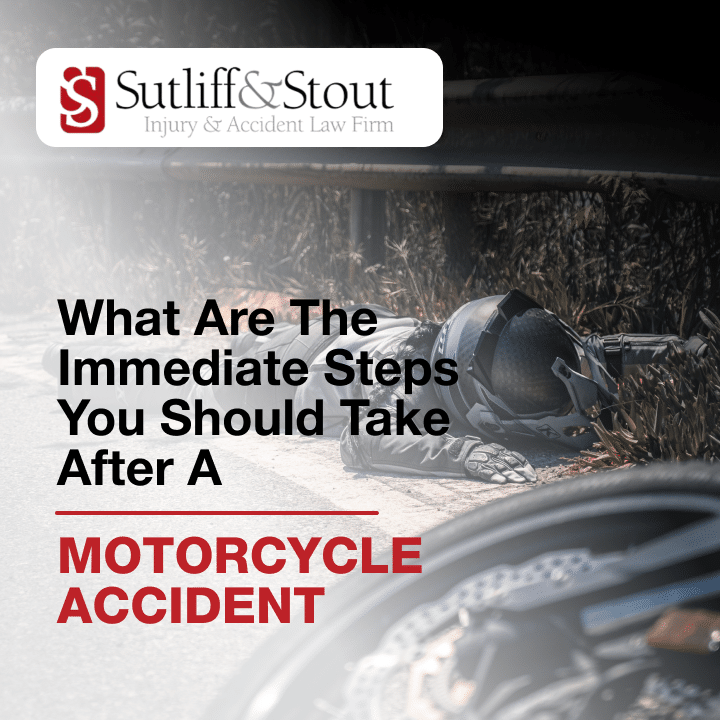
Motorcycle accidents can be life-changing, leaving victims with a maze of legal and financial challenges to navigate. When it comes to seeking justice and compensation, the role of a motorcycle accident lawyer is indispensable. These legal professionals step in to guide victims through the complex process of filing a motorcycle accident claim, aiming to secure the financial restitution necessary for a full recovery.
From gathering evidence and negotiating with insurance companies, to possibly taking the case to court, a motorcycle lawyer will handle every aspect of your case, allowing you to focus on your recovery and moving forward with your life.
What Does a Motorcycle Accident Lawyer Do?
An attorney who specializes in motorcycle accident claims can offer legal support and guidance through every phase of the process, from conducting an investigation of the incident and compiling evidence, to engaging with insurers and advocating on the claimant’s behalf in court.
Assess Financial Impact of the Accident
The financial impact of a motorcycle accident can be profound, affecting the client’s life in both the short and long term. A thorough assessment must account for immediate medical expenses, loss of income, repair or replacement of the motorcycle, and any other property damage. Future financial considerations include long-term care costs, loss of future earning potential, and lifestyle modifications required by the injury.
Gather Evidence
Gathering evidence starts with collecting police reports, which serve as an authoritative narrative of the accident, shedding light on crucial details and potentially hinting at fault. Medical records play a vital role in documenting the injuries suffered, laying the groundwork for claims related to medical expenses and compensation for pain and suffering.
Witness statements provide firsthand perspectives on the accident, lending support to the client’s account of events. Photos or videos of the accident scene act as visual evidence of the conditions leading to the accident and the extent of damage incurred.
Determine Liability
Determining liability involves an analysis of accident reports, evidence, and witness statements to accurately identify the responsible party or parties. Establishing liability shapes the trajectory of the claim, including negotiations with insurers and legal strategies in court.
Analyze Accident Reports and Evidence
Analyzing accident reports and evidence forms the cornerstone of establishing liability in a motorcycle accident claim. This process involves combing through official accident reports, medical documentation, and all gathered visual evidence. Legal professionals dissect these materials to construct a coherent narrative of the event, pinpointing critical moments that led to the accident.
Consult with Accident Reconstruction Experts
Accident reconstruction experts bring a wealth of knowledge in physics and vehicular mechanics to re-enact the accident scenario, providing deep insights into the sequence of events. Their expertise is particularly valuable in explaining aspects such as the vehicles’ speeds, the angles at which they collided, and the precise actions of the parties involved just before the impact.
Assess Damages
Assessing damages involves a detailed evaluation of physical injuries, which is crucial for calculating both the immediate and future medical expenses. The process also involves an assessment of property damage, including the costs to repair or replace the motorcycle and any damaged gear.
Additionally, the assessment covers lost wages, accounting for the income the victim has lost during their recovery period. For those whose injuries affect their future earning capacity, the evaluation also projects potential future losses. This thorough examination ensures that a motorcycle accident lawyer pursues every penny of compensation you’re entitled to.
Evaluate Physical Injuries and Medical Expenses
Evaluating physical injuries and medical expenses focuses on the health repercussions and financial impact of a motorcycle accident. This step involves a detailed examination of medical records to document the extent and severity of injuries. Additionally, it requires calculating both the costs of initial medical treatment and the estimated expenses for future medical care necessary for rehabilitation.
Assess Property Damage to the Motorcycle and Gear
Assessing property damage to the motorcycle and gear involves estimating the repair or replacement costs of the motorcycle, as well as any personal protective gear (helmets, jackets, gloves) that was damaged. Accurately appraising the extent of property damage will ensure the compensation claim fully addresses all tangible losses suffered by the victim.
Calculate Lost Wages and Potential Future Losses
Calculating lost wages and potential future losses addresses the significant economic impact of a motorcycle accident. This process involves determining the income lost due to the victim’s inability to work during their recovery. It also considers any future economic losses stemming from a diminished capacity to earn, due to long-term or permanent injuries.
File the Claim
The claim submission must include a well-organized collection of documentation and evidence. This includes medical records, proof of property damage, evidence of lost wages, and any other pertinent materials that support the accident victim’s demand for compensation. The goal is to construct a thoroughly documented claim that clearly outlines the victim’s losses and underscores the legitimacy of their request for compensation.
Negotiate with Insurance Adjusters
This phase demands a strategic and informed approach, as adjusters often make initial offers that fall short of the claim’s actual value. The negotiation entails a presentation of the evidence and documentation collected, supporting the severity of the damages and the legitimacy of the compensation sought.
File a Lawsuit if Necessary
Filing a lawsuit becomes a necessary step when negotiations with insurance adjusters fail to yield a fair settlement. This action shifts the focus from negotiation to litigation, taking the claim into the courtroom to seek justice and appropriate compensation through the legal system. The process begins with the drafting and filing of a formal complaint against the entities responsible for the accident.
This step is a clear indication of the victim’s determination to pursue the full extent of compensation legally entitled to them for the damages incurred.
Draft and File a Complaint in Court
Drafting and filing a complaint in court marks the formal commencement of legal proceedings against the parties deemed responsible for the motorcycle accident. This document lays out the factual and legal foundation of the claim, specifying the incident details, the resultant damages, and the compensation being sought.
Conduct Discovery to Gather More Evidence
Conducting discovery involves an exchange of information and evidence between the plaintiff and defendant. This phase can include depositions, document requests, and written interrogatories, all aimed at uncovering evidence that could impact the case’s outcome. Discovery is instrumental in building a strong case by ensuring that both sides have a full understanding of the evidence and arguments that will be presented at trial, thereby facilitating a fair and informed judicial process.
Attend Pre-Trial Conferences and Hearings
Attending pre-trial conferences and hearings plays a vital role in the preparation for trial. These sessions, presided over by a judge, are convened to address procedural and substantive issues before the trial formally begins. Objectives include exploring settlement options, determining the admissibility of evidence, and establishing a clear timeline for the trial proceedings.
Represent the Client in Court
This phase sees the attorney actively advocating for the client, presenting the case with precision and persuasiveness before a judge or jury. The motorcycle accident lawyer’s role involves presenting the facts of the accident, demonstrating the extent of damages, and establishing the defendant’s liability.
When Should You Get a Lawyer for a Motorcycle Accident?
Not every accident will require the skills and expertise of a motorcycle accident lawyer. In some cases, you can handle the claim alone. However, for complex accident claims, you should get a lawyer as soon as possible.
If you’re dealing with the following issues, contact an attorney:
- You were injured
- Liability is disputed
- Multiple parties are involved
- Your insurance claim is denied
- The insurance company is refusing to make a reasonable settlement offer
By hiring an attorney to represent your claim, you can significantly increase your chances of recovering the fair settlement you’re owed for an accident that was not your fault.
Your Recovery Starts Here – Book a 100% Free Consultation!
If you were injured in a motorcycle accident that was caused by a negligent driver, let the legal team at Sutliff & Stout help. Contact us today to schedule a free consultation with an experienced motorcycle accident lawyer on our legal team to learn more.
- What is a Catastrophic Injury? - January 30, 2025
- Essential Guide for Pedestrians Hit by Cars in Texas - January 30, 2025
- How to File a Wrongful Death Lawsuit in Texas - January 15, 2025








 (713) 405-1263
(713) 405-1263  550 Post Oak Blvd, Suite 530
550 Post Oak Blvd, Suite 530